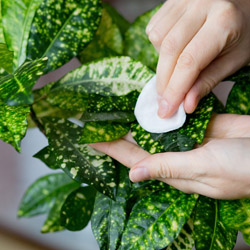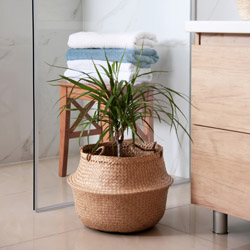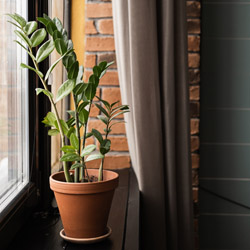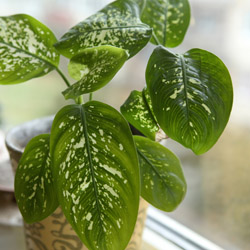With programmable thermostats, double-paned windows, and other tricks, we are able to keep our homes at the same climatic comfort level year-round. Indoor houseplants, however, can be sensitive to subtle seasonal changes. Even in a balanced home environment, proper winter houseplant care is essential to help plants thrive through this challenging season.
Winter Changes in Home Climates
While the winter changes in our homes are more subtle than the harsh freezes and deep snowfall outdoors, our home environments actually change more than we may realize. Depending on the conditions we like to maintain and the climate outdoors, winter changes may include…
- Fewer hours of daylight, and the daylight that does exist is less intense than during the summer.
- Lower temperatures often accompanied by chilly drafts from windows and doors.
- Lower humidity levels, particularly if central heat has been running, which can dry out air.
These conditions are less than ideal for many houseplants, particularly tropical species that are adapted to longer hours of sunlight, higher temperatures, and richer humidity. Fortunately, with some extra care, winter houseplants can adapt and thrive even during the harshest winter months.
Adjusting Winter Houseplant Care
There are several steps you can take to adjust your houseplant care during the winter. Easy and effective steps include…
- Reducing Watering – Many houseplants go dormant in the winter, and while their growth is slowed, they require much less water. Overwatering in winter can lead to root rot and other plant damage, so avoid watering houseplants excessively in the winter months. When you do water your houseplants, use room-temperature water to avoid shocking the plants’ roots.
- Reducing Feeding – Similar to reducing the water a plant receives while dormant, reducing fertilizer is a good step to care for winter houseplants. Plants do not need as much nutrition when their growth is slowed and reducing plant food until spring will keep the plants from developing leggy or spindly growth.
- Improving Humidity – Using a humidifier is a great way to provide better humidity for winter houseplants. Other options include clustering plants together so they can share the humidity from their own respiration, as well as positioning plants in a bathroom where humidity is naturally higher. Misting frequently can also help improve humidity, as can using a pebble tray underneath the plants, so long as the pots are not resting in water.
- Relocating Plants – Moving winter houseplants to south or west-facing windows where they will get more light can help them thrive in winter. Take care that the plants’ foliage does not brush window glass, however, or the plants may get chilled or frosted.
- Supplementing Light – In darker rooms or when dreary winter days seem endless, adding supplemental lights near houseplants can help them flourish. Choose the appropriate bulb size and strength for your plants’ needs. Other steps to increase natural light include opening draperies and washing windows so more light reaches each plant.
- Dusting Plants – Houseplants easily acquire a layer of dust and debris without outdoor breezes to keep them clean. Use a soft, damp cloth to carefully wipe each plant’s foliage to remove that dusty layer or give plants a gentle shower to water and clean them at the same time. Clean plants will be able to absorb light more effectively.
- Rotating Plants – Plants will stretch and turn their foliage in an effort to reach more sunlight, particularly in winter. To minimize this stretching and help keep plants growing straight and upright, rotate them every few days. This is easy to do for larger plants on casters or mobile plant stands.
- Watching for Pests – Even in winter, pests can infest houseplants. Be diligent about watching for spider mites, mealy bugs, fungus gnats, and other common houseplant pests, and use insecticidal soap or neem oil spray to control the pests as soon as they appear, keeping the infestation from spreading to other plants.
Houseplants have many benefits, particularly in winter when an urban jungle can help mitigate Seasonal Affective Disorder and alleviate the depression and anxiety that often accompanies dreary winter days. By following proper winter houseplant care, you can keep all your plants happy and thriving even during more challenging months, just when you need their inspiration and a connection to nature the most.







